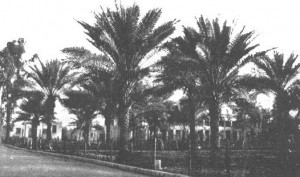The views expressed in our content reflect individual perspectives and do not represent the authoritative views of the Baha'i Faith.
I’ve been thinking about the meaning of the Twelve Days of Ridvan, for Baha’is the “Most Great Festival.”
During this auspicious time in 1863, Baha’u’llah wrote the Ridvan Tablet. It describes what this temporary garden respite, a gift from a Baghdad notable named Najib Pasha who admired Baha’u’llah, actually meant.
A broad river flowed nearby, Najib Pasha’s garden overflowed with blooming roses, and nightingales sang all night—all that is true. But this wasn’t merely a pleasant campground, a chance to rest up for the arduous further banishment of Baha’u’llah and his companions.

Ridvan Garden in Baghdad
The tablet (just a formal word for a piece of writing) takes the form of a conversation, crafted by Baha’u’llah, between God–the unknowable Maker, the mysterious Source, the “Well-Beloved of all worlds”–and the Most Exalted Pen, the Revealer of God’s undoubted proofs, His chosen messenger. It helps us to understand these important questions just a little better: who was Baha’u’llah? What is the nature of His work in the world? And for those who wish to follow his counsel, what are we supposed to do?
Ridvan takes me, born into the Baptist Church, back to the garden of Eden. In literature, in song, in prophecy, many traditions assert that “we’ve got to get ourselves back to the Garden” (as Joni Mitchell wrote and sang). All of those traditions long for some human condition of happiness and peace and enduring love. I suggest to you that Baha’u’llah’s retirement to a garden, one that he named Ridvan–paradise–was no mere accident, but a profound acknowledgement that the hopes and longings of history were now being planted, in a strangely new yet somehow deeply familiar garden. That garden of paradise gives nourishment to hope and brings a signal to the world: the Kingdom of God on Earth is now under construction.
You might say, “But Baha’u’llah was forced to leave what he called Paradise! Where’s the hope in that?”
Listen to what the Tablet of Ridvan says for the answer. While Baha’u’llah represents a familiar figure from spiritual history–the teacher, the redeemer, the physician, the lawgiver–the Faith he brings is unprecedented. It fulfills the expectations of all the spiritual traditions of the past–“one fold, one shepherd,” where “the meek shall inherit the earth,” when we shall see “a new heaven, and a new earth.” As he transformed that Baghdad way station of banishment into a blissful garden of hope, Baha’u’llah wrote:
This is the Day whereon the unseen world crieth out: “Great is thy blessedness, O earth, for thou hast been … chosen as the seat of His mighty throne …”
This is the Paradise on whose foliage the wine of utterance hath imprinted the testimony: “He that was hidden from the eyes of men is revealed, girded with sovereignty and power!” This is the Paradise, the rustling of whose leaves proclaims: “O ye that inhabit the heavens and the earth! There hath appeared what hath never previously appeared. He Who, from everlasting, had concealed His Face from the sight of creation is now come …” – Gleanings from the Writings of Baha’u’llah, p. 31.
This was Baha’u’llah’s public announcement, first to his companions (many of whom were already convinced), and then to a waiting but distracted world. This is why Baha’u’llah’s public declaration of his mission has become the greatest festivity of them all for Baha’is: because the garden of Ridvan served as a bridge between the ancient yearnings of all peoples for a paradise of truth, justice and the great coming together, and the glorious future that Baha’u’llah assures us will, in fact, come.
Some people expected a burst of sudden global magic, an instantaneous pageant of God’s power, in which the divine will would be done on earth, as Christ’s prayer has taught us to yearn, without any human effort or agency or even awareness. Baha’u’llah proclaimed otherwise. He lived and taught the principles that humanity would need to achieve its maturity, and then said, in effect, Go build the Kingdom.
So how should we think of Baha’u’llah? This is what he says to the world, and to each of us:
Attract the hearts of all men, through the call of Him, the one alone Beloved. Say: This is the Voice of God, if ye do but hearken. This is the Dayspring of the Revelation of God, did ye but know it. This is the Dawning-Place of the Cause of God, were ye to recognize it. This is the Source of the commandment of God, did ye but judge it fairly. This is the manifest and hidden Secret; would that ye might perceive it … – Ibid., p. 33.
Baha’is try to enact that prescription, put in motion the unifying processes, and build the harmonizing and unifying institutions given to us by Baha’u’llah. His son, Abdu’l-Baha, left behind a wonderful prayer. In it, we call on the heavens to enlighten our hearts, and to “confer upon me thoughts which may change this world into a rose garden through the outpourings of heavenly grace…” – Baha’i Prayers, p. 72.
For Baha’is, this is what the Creator, the Great Spirit, an unknowable God gave to Baha’u’llah: the mighty thoughts that, starting with the seeds planted in a Baghdad garden, would then proceed–organically, humanly, unsteadily but inevitably–to reform the world. Isn’t that something to celebrate?!
















Comments
Sign in or create an account
Continue with Googleor